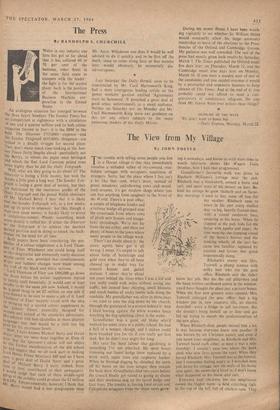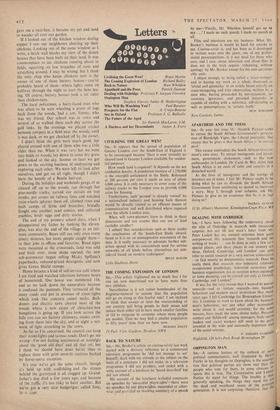The View from My Village
By JOHN FOSTER
'There's no doubt about it : the estate agents have got it all wrong. I mean, it's stupid to talk about fields of buttercups and gold corn when they've all been chewed up to make way for
council houses and petrol stations. I swear they're about ten years behind the times when I was a kid and you really could walk miles without seeing any traffic, but instead hear chirping, smell blossom and touch bushes of sticky lambs'-tails along the roadside. My grandfather was alive in those.days --we used to take the dog down by the church, through the graveyard, to a stream behind it. And I liked leaning against the white wooden fence watching the dog splashing about in the water, Grandfather was a good old bloke who'd worked for some years at a public school. He had a hell of a temper, though, and I reckon could have knocked you for six if you really got him mad, But he didn't stay angry for long.
His taste for hard labour like gardening is something I've not inherited. He spent hours trimming our laurel hedge (now replaced by a brick wall), apple trees and raspberry bushes. When he finished digging he chiselled the earth off his boots on the iron scraper then outside the back door. G randfather died two years before the council finally got round to giving us drains and their workmen dug up the laurel hedge and fruit trees. The trouble is, having food in tins and Cellophane wrappers from the shops saves grow-
ing it nowadays, and leaves us with more time to watch television shows like Wagon Train (brother, how I hate that programme).
tractors and lorries that grind impersonally along.
Rhubarb's enemy was Mrs. Torevell, a plump woman with milky hair who ran the post office. Rhubarb said she didn't know her job. But for the red pillar-box and the hand-written cardboard notice in the window, you'd have thought the place just a private house. When the first new grocery store opened, Mrs. Torevell enlarged the .post office—had—had a big window put in, new counters. tills, an electric door-bell--even a fridge to sell ice-cream. But she couldn't bring herself up to date and got fed up trying to match the professionalism of the new place.
When Rhubarb died, people missed him a lot. It was because everyone knew one another (I was known by my Christian name), and even if you hated your neighbour, as Rhubarb and Mrs. Torevell hated each other, at least it was a rela- tionship: I couldn't care less about the bank clerk who now lives across the road. When they buried Rhubarb, Mrs. Torevell was at the funeral, and I remember feeling angry as I watched men pull down his cottage, saw the walls of his home torn apart, the rooms he'd lived in. I don't know what happened to his horse and cart.
Everyone kept chickens, but our neighbours owned the biggest farm----a field stretching right to the top of the hill, full of chicken-runs. They
gave me a runt-hen; it became my pet and used to wander all over our garden.
If I looked out of the kitchen window during supper I saw our neighbours shutting up their chickens. Looking out of the same window as I write, a brick wall blocks my view of the dozen houses that have been built on their land. It was commonplace to see chickens running about in fields, squatting on low branches of trees and scratching around. I may be wrong, but 1 think the only chap who keeps chickens now is the owner of one of those battery houses—you've probably heard of them—where lights come on -halfway through the night to start the hens lay- ing. Of course, battery houses look a lot tidier than chicken-runs.
The local policeman, a hairy-faced man who was often to be seen wheeling a pram of logs back from the woods, had a son, Jimmy, who was my friend. Our school was in town and several of us walked there each day across the golf links. In the evenings we nl.t■.ed cricket between cowpats in a field near the woods, until it was dark, or we got chucked off by the owner.
I didn't think the girls were much good, but played around with one of them who was a little older than me. When it was ,very hot we went into fields or woods, lay down in some dry grass and looked at the sky. Sooner or later we got down to the exciting business of undressing and exploring each other. We were left to look after
' ourselves, and got on all right, though 1 didn't have the benefit of a Beatle hair-cut.
During the holidays and weekends gangs of us cleared off up to the woods, ran through hot pine-needle tracks, carved our initials on tree trunks, put stones on railway lines and watched train-wheels splutter them off, climbed trees and built camps of ferns and branches, brutally fought one another, read comics, and collected marbles, birds' eggs and dirty stories.
The end of my primary school days, when 1 disappointed my father by funking the eleven- plus, was also the end of the village as an inti- mate community. Buses still ran only once every ninety minutes. but more people caught them-
• to their jobs in offices and factories. Road Signs were mounted at the crossroads, land was sold and built over, more shops opened, the new sub-postmaster began selling Micky Spillane's paperbacks, reduced-priced detergents, and now gives Green Shield stamps.
Home became a kind of self-service cafe' where I ate food and watched television between bouts of homework. Our house was numbered 11B, and so we took down the name-plate because it confused the postman. They tarmaced all the stony roads and put in avenues of street-lights which look like concrete camel necks. Bull- dozers and electric saws cleared most of the woods where a new estate of chocolate-box bungalows is going up. If you look across the hills you can see factory chimneys, smoke swirl- ing from them into the sky, and at night a net- work of light stretching to the town.
As far as I'm concerned, the council can keep their street-lights and tarmac roads. Don't get me wrong—l'm not feeling sentimental or nostalgic about the 'good old days' and all that rot, but I think we should have done better than to replace them with grim neon-lit routines backed by horse-opera escapism.
It's true we've got the same church, though it's held up with scaffolding and the stream behind the graveyard is all clogged up. Grand- father's dog died a few years ago, and because of the traffic it's too risky to have another. But we've got a very nice budgerigar, called Joey, in a cage.



































 Previous page
Previous page